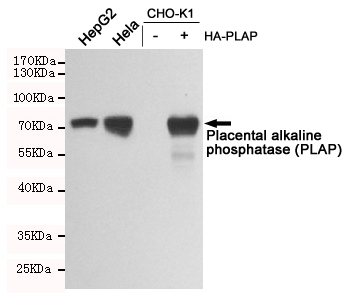-
Product Name
Anti-Placental alkaline phosphatase (PLAP) Mouse antibody
- Documents
-
Description
Placental alkaline phosphatase (PLAP) Mouse monoclonal antibody
-
Tested applications
WB
-
Species reactivity
Human
-
Alternative names
Alkaline phosphatase; Alkaline phosphatase placental; Alkaline phosphatase placental type; Alkaline phosphatase Regan isozyme; ALP; Alp1; ALPP; FLJ61142; Germ-cell alkaline phosphatase; nagao isozyme; OTTHUMP00000164354; PALP; Placental alkaline phosphata antibody
-
Isotype
Mouse IgG1
-
Preparation
Antigen: Purified recombinant Placental alkaline phosphatase (PLAP) protein fragments expressed in E.coli.
-
Clonality
Monoclonal
-
Formulation
PBS(pH 7.4) containing with 0.03% Proclin300 and 50% glycerol.
-
Storage instructions
Store at 4°C short term. Store at -20°C long term. Avoid freeze / thaw cycle.
-
Applications
WB: 1/1000
-
Validations

Western blot analysis of extracts from HepG2, Hela, CHO-K1 and CHO-K1 transfected pcDNA3.1-HA-PLAP cell lysates using Placental alkaline phosphatase (PLAP) mouse mAb (1:1000 diluted).Predicted band size:70KDa.Observed band size:70KDa.
-
Background
Swiss-Prot Acc.P05187.Mammalian alkaline phosphatases (APs) are highly conserved zinc-containing allosteric enzymes that are able to hydrolyze and transphosphorylate a wide range of compounds. There are four known human alkaline phosphatase isozymes: TNAP (tissue-nonspecific; bone/liver/kidney), ALPP (placental), ALPP2 (germ cell), and ALPI (intestinal) . Placental alkaline phosphatase (ALPP) is bound to the plasma membrane via a glycosyl-phosphatidylinositol (GPI) anchor. It is expressed primarily in the placenta and may be involved in transplacental IgG transport. ALPP has been found to be overexpressed on the surface of several different types of solid tumor cells and elevated serum concentrations of ALPP and ALPP-like enzymes has been found to be associated with ovarian, cervical, and testicular cancer.
Related Products / Services
Please note: All products are "FOR RESEARCH USE ONLY AND ARE NOT INTENDED FOR DIAGNOSTIC OR THERAPEUTIC USE"
